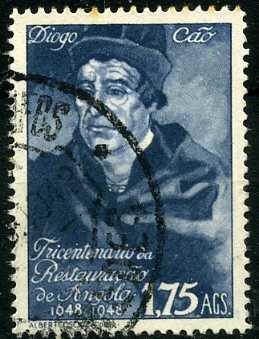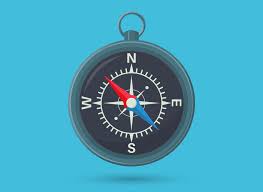Stamp: Diego Cao (c.1452-c.1486) navigator & explorer (Angola 1948)
Diego Cao (c.1452-c.1486) navigator & explorer (Angola 1948)
01 May (Angola ) within release 300th anniv. of the restoration of Angola to Portugal goes into circulation Stamp Diego Cao (c.1452-c.1486) navigator & explorer face value 1.75 Angolan angolar
| Stamp Diego Cao (c.1452-c.1486) navigator & explorer in catalogues | |
|---|---|
| Michel: | Mi:AO 310 |
Stamp is vertical format.
Also in the issue 300th anniv. of the restoration of Angola to Portugal:
- Stamp - São Miguel Fort - Luanda face value 5;
- Stamp - Our Lady of Nazareth Church - Luanda face value 10;
- Stamp - King John IV (1604-1656) face value 30;
- Stamp - Salvador Correia de Sa e Bene Vides (1594-1688) face value 50;
- Stamp - Capitulation of Luanda face value 1;
- Stamp - Diego Cao (c.1452-c.1486) navigator & explorer face value 1.75;
- Stamp - Rock Cross of Yelala face value 5;
- Stamp - Paulo Dias de Novais (1510-1589) colonizer face value 10;
- Stamp - Fort Massangano face value 20;
- Maxi Cards - Our Lady of Nazareth Church - Luanda face value 10;
- Souvenir Sheet - 300th Anniversary of Restoration of Angola to Portugal face value 40.70;
|
Data entry completed
80%
|
|
|---|---|
| Stamp Diego Cao (c.1452-c.1486) navigator & explorer in digits | |
| Country: | Angola |
| Date: | 1948-05-01 |
| Size: | 25 x 35 |
| Perforation: | 14 |
| Format: | Stamp |
| Face Value: | 1.75 Angolan angolar |
Stamp Diego Cao (c.1452-c.1486) navigator & explorer it reflects the thematic directions:
Exploration is the process of exploring, an activity which has some expectation of discovery. Organised exploration is largely a human activity, but exploratory activity is common to most organisms capable of directed locomotion and the ability to learn, and has been described in, amongst others, social insects foraging behaviour, where feedback from returning individuals affects the activity of other members of the group
A navigator is the person on board a ship or aircraft responsible for its navigation. The navigator's primary responsibility is to be aware of ship or aircraft position at all times. Responsibilities include planning the journey, advising the ship's captain or aircraft commander of estimated timing to destinations while en route, and ensuring hazards are avoided. The navigator is in charge of maintaining the aircraft or ship's nautical charts, nautical publications, and navigational equipment, and they generally have responsibility for meteorological equipment and communications. With the advent of satellite navigation, the effort required to accurately determine one's position has decreased by orders of magnitude, so the entire field has experienced a revolutionary transition since the 1990s with traditional navigation tasks, like performing celestial navigation, being used less frequently. Using multiple independent position fix methods without solely relying on electronic systems subject to failure helps the navigator detect errors. Professional mariners are still proficient in traditional piloting and celestial navigation.


